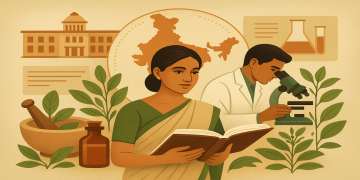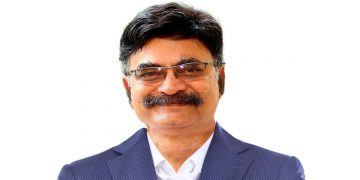In a rapidly evolving world where education often struggles to keep pace with industry demands, Kuldip Sarma, Co-Founder and Pro-Chancellor of Medhavi Skills University (MSU), Sikkim, stands out as a visionary social architect. His mission to empower Indian youth through purpose-driven, skill-integrated education has sparked a quiet revolution, particularly in underserved regions like the Northeast. In this exclusive interview, Sarma shares the personal experiences that shaped his journey, the transformative changes he’s spearheading at MSU, and his bold vision for redefining higher education in India. From bridging the employability gap to fostering entrepreneurship, his insights offer a compelling blueprint for a future where every young Indian can turn their aspirations into reality.
Q. What personal experiences shaped your mission to empower Indian youth through education?
My journey has been anchored in the belief that education is the most powerful catalyst for social transformation. This conviction took root during my work with the Medhavi Foundation in the Northeast, where I encountered a stark paradox: young people brimming with talent and ambition, yet constrained by challenges like drug addiction, limited access to quality education, and chronic unemployment. Witnessing such untapped potential was profoundly disheartening.
That moment was a turning point. I realised we needed an educational model that went beyond traditional academics, one that equipped youth with skills, purpose, and pathways to dignified livelihoods. This vision led to the creation of Medhavi Skills University (MSU) in 2021, with Sikkim as our anchor, a region brimming with promise. By harnessing the potential of its youth, we aim to transform individual lives and contribute significantly to India’s growth story. My mission is clear: no young person should be left behind due to their geography or socio-economic background. At MSU, we’re not just building a university; we’re fostering hope, resilience, and a movement for inclusive progress.
Q. What inspired you to co-found Medhavi Skills University, and how has your vision evolved since its inception?
The inspiration for MSU stemmed from a glaring disconnects between traditional education and industry needs. Having worked extensively in education and skill development, I saw countless young graduates struggling to find meaningful employment due to a lack of job-ready skills. It was evident that India needed a new model of higher education—one that was inclusive, outcome-driven, and deeply integrated with the world of work.
MSU was founded on the belief that education should empower individuals to build careers, launch businesses, and contribute to the economy. We envisioned a system where skill development, industry engagement, and apprenticeship-based learning were at the core of the academic framework. Since 2021, our vision has deepened. We’ve recognised the critical role of collaborating with local communities, regional economies, and national skill missions. Our initiatives in the Northeast, for example, focus on empowerment, entrepreneurship, and sustainable livelihoods in underserved areas.
Policy frameworks like the National Education Policy (NEP) and the National Credit Framework (NCrF) have further reinforced our approach, showing that academic learning and skill training must form a unified ecosystem. Today, MSU is more than an institution—it’s a movement, bridging aspiration and opportunity, with an impact that will resonate far beyond our campuses.
Q. How do you define “purpose-driven education,” and why is it critical in today’s educational landscape?
Purpose-driven education, to me, is about anchoring learning in meaning and application. It’s not just about acquiring knowledge but understanding its relevance and using it to address real-world challenges. It aligns education with students’ aspirations and industry demands, inspiring them to find purpose in their work—whether as professionals, entrepreneurs, or community changemakers.
When we established MSU, this philosophy became our foundation. We created a learning environment that extends beyond textbooks, integrating industry-aligned programmes and real-world experiences through initiatives like our Work-Integrated Skill-Based Higher Education (WISE). This approach ensures students are active participants in their futures from day one, combining academic learning with on-the-job training.
In today’s fast-evolving world, where technology reshapes industries and traditional career paths shift, purpose-driven education is vital. Students demand relevance and adaptability, while employers seek skilled, purpose-driven professionals with ethical grounding. In a diverse nation like India, education must also drive nation-building by bridging economic disparities and fostering entrepreneurship. Our work in the Northeast and other underserved regions shows how education, when rooted in purpose, can transform lives and communities. It’s about helping students discover who they are and how they can contribute to the world.

Q. As Pro-Chancellor, how do you ensure MSU remains agile and relevant in a dynamic global landscape?
Agility and relevance are non-negotiable in a world where work, technology, and learning are in constant flux. As Pro-Chancellor, my role is to ensure MSU doesn’t just keep pace but leads the way.
We achieve this through deep engagement with industry leaders, co-designing programmes delivered in real-world settings via Apprenticeship-Embedded Degree Programmes (AEDP). This ensures our graduates possess practical, future-ready skills alongside theoretical knowledge. We also prioritise learners’ needs, offering flexible “earn-and-learn” models, modular programmes, and credit systems aligned with the NCrF to cater to diverse aspirations and life stages.
Our governance model embraces experimentation—whether adopting emerging technologies, integrating AI into curricula, or addressing local needs through regional skilling initiatives. We collaborate with policymakers and thought leaders to shape the broader educational ecosystem. Our mission is to transform education into a dynamic enabler of change, and that’s how we stay agile and relevant.
Q. What transformative changes have you implemented at MSU to align with the demands of students and industries?
At MSU, our goal is to make education synonymous with employability. A key transformation has been embedding an industry-integrated, skill-based model into our core. Students don’t just study in classrooms; they gain hands-on experience through mandatory on-the-job training. Our WISE programmes allow students, especially from marginalised backgrounds, to earn stipends while learning, redefining traditional placements. From day one, students work in industries, gaining familiarity with real-world needs and often securing jobs with our partners.
We’ve also forged robust industry-academia collaborations, co-creating curricula with leading partners to ensure our programmes are current and future-ready. From hospitality to healthcare, logistics to retail, our training meets sector-specific demands. By addressing industry challenges like skill shortages and high attrition rates, we’re enhancing retention and productivity. Our reforms aim to bridge the gap between aspiration and achievement, nurturing skilled professionals ready to lead India’s growth with confidence.
Q. How does MSU address the employability gap faced by Indian graduates?
India faces a paradox: millions of graduates enter the job market annually, yet many remain unemployable due to a lack of practical skills. At MSU, we see this as a national responsibility and an opportunity for systemic change.
We bridge the employability gap by embedding industry-academia integration into our curricula. Every programme is designed with industry stakeholders, ensuring relevance, hands-on learning, and workplace exposure from the start. By aligning with national priorities like the NEP and Skill India Mission, we make our offerings future-focused and policy-compliant. Frameworks like AEDP, NAPS, NATS, ABC, and RPL enable students to achieve academic goals while staying industry-relevant. At MSU, we’re building a “Saksham and Sashakt Bharat” (Capable and Empowered India), preparing graduates who are not just educated but employable.
Q. How do you nurture student aspirations beyond academics, particularly in career guidance and life readiness?
At MSU, we believe education must prepare students for life, not just jobs. Our mission is to nurture confident, self-aware individuals ready to lead. We achieve this through:
On-the-Job Learning (OJL)/Training (OJT): With over 300 industry partners, students gain practical experience, honing networking, problem-solving, and soft skills.
Soft Skills Training: Structured programmes in Spoken English, Business English, and Communication Skills build confidence for professional interactions.
Skill-Drill Fridays: Weekly interdisciplinary activities broaden students’ perspectives and foster collaboration.
Industry-in-Campus: Workshops and networking sessions with industry experts bring real-world challenges to campus.
Certification Programme Initiative: Industry-relevant certifications, like AWS for Computer Science students, enhance employability.
Entrepreneurial Education Workshops: Online and in-person sessions on idea generation, business planning, and financial literacy nurture entrepreneurial mindsets.
We also promote holistic development through credit-bearing extracurriculars like fests and community drives, fostering leadership and teamwork. India’s youth are ambitious—we provide the tools and belief to turn their dreams into action, empowering them as leaders, creators, and changemakers.

Q. Medhavi Foundation has expanded to 22 states—how do you maintain consistency and impact at such a scale?
Scaling impact across 22 states requires clarity of mission and robust systems. Since founding the Medhavi Foundation in 2012, our goal has been to bridge India’s skill gap through vocational training, life skills, and industry exposure.
We ensure consistency with a framework of best-in-class learning technologies, expert trainers, and quality skill training centres, backed by strong monitoring systems. Collaborations with the NSDC, State Skill Missions, and corporate partners bring scale, credibility, and relevance, aligning our training with industry needs and national priorities like Skill India and NEP 2020.
The Foundation’s work feeds into MSU’s vision of industry-integrated higher education, creating a seamless bridge between skilling and academia. By focusing on local impact with national alignment, we deepen our reach—one learner, one community, one success story at a time.
Q. Can you share a moment from your work with the Foundation that deeply impacted you?
One of the most moving experiences came during our work with women’s Self-Help Groups in Tripura in 2022–23, supporting over 63,000 women across 7,696 SHGs under the Tripura Rural Livelihood Mission. In a small village, I met a group of women who had transformed from being hesitant to speak publicly to confidently running an agri-business cooperative. One woman shared how she once relied entirely on her husband’s income but now earns and mentors others, her eyes shining with pride.
That moment encapsulated empowerment—not just financial but rooted in dignity and self-worth. It reaffirmed my belief in community-driven, skill-based initiatives as catalysts for generational change, strengthening my commitment to both the Foundation and MSU.
Q. What strategies have you adopted to integrate skilling, education, and entrepreneurship across India’s diverse regions?
Our approach, through the Medhavi Foundation and MSU, is rooted in inclusive, purpose-driven development. We tailor programmes to regional realities, ensuring relevance in areas from the Northeast’s tribal belts to Western India’s industrial corridors. Industry-academia partnerships embed real-world exposure and apprenticeships, while entrepreneurial workshops on financial literacy and business planning nurture job creators.
Aligning with national missions like Skill India, Start-Up India, and NEP 2020, we ensure scalability and relevance. From job fairs in Himachal Pradesh to India’s first Centre of Excellence for Gems and Jewellery in Kerala, the Medhavi Group is empowering youth to become truly Atmanirbhar (self-reliant).
Q. How do you approach leadership and mentorship at institutional and individual levels?
Leadership, to me, is vision with empathy; mentorship is empowering others to find their purpose. Institutionally, I build transparent, agile systems, engaging with industry, policymakers, and academics to keep our programmes future-ready. Individually, I prioritise dialogue with students and faculty, listening to their aspirations and challenges. Leadership isn’t a title—it’s a responsibility to inspire and co-create impact, bridging ambition and achievement for India’s youth.
Q. What values do you instil in your leadership team to foster innovation and empathy?
I encourage my team to prioritise purpose over position. Innovation means challenging the status quo in pedagogy and learner engagement, while empathy requires understanding our students’ diverse realities. We foster curiosity, courage, and collaboration, building a skill-driven, value-led ecosystem through industry-academia partnerships. Our goal is national progress through individual empowerment.
Q. What has been the most fulfilling part of your journey with Medhavi?
The most fulfilling part is seeing young individuals transform their lives. A boy from Kolhapur, who once walked kilometres to school, enrolled in our skill programme, secured a placement at Sterling Resorts, and now works at the Hyatt in Mumbai. His journey reflects Medhavi’s vision: bridging potential and opportunity. At MSU, we’re not just granting degrees—we’re building pathways to sustainable livelihoods.
Q. How do you envision MSU’s growth over the next five years, particularly in international collaborations?
In five years, MSU will be a global hub for skill-integrated education, rooted in India’s development goals. We’re forging partnerships with international universities, sector skill councils, and employers, like our Skill Hub for International Employment (SHINE) in Ahmedabad and collaboration with TAFE Queensland, Australia. As an authorised TestAS centre, we’re boosting global mobility, democratising education for all.
Q. What is your message to young leaders shaping society through education and community change?
To young leaders, I say: meaningful change starts at the grassroots. Leadership lies in listening, empathising, and uplifting others. Immerse yourself in communities, co-create solutions, and don’t wait for perfect conditions. In India’s vast potential, focus on inclusive, value-driven systems. A simple idea, backed by conviction, can transform lives. Be bold, compassionate, and the leader India needs.
Kuldip Sarma’s journey with Medhavi Skills University and the Medhavi Foundation is a powerful testament to education’s role as an equaliser. By blending skills, industry collaboration, and empathy, he is not only empowering India’s youth but also redefining higher education as a catalyst for nation-building. As MSU grows, Sarma’s vision offers a roadmap for a skill-driven, inclusive India, ready to shine on the global stage.




























































